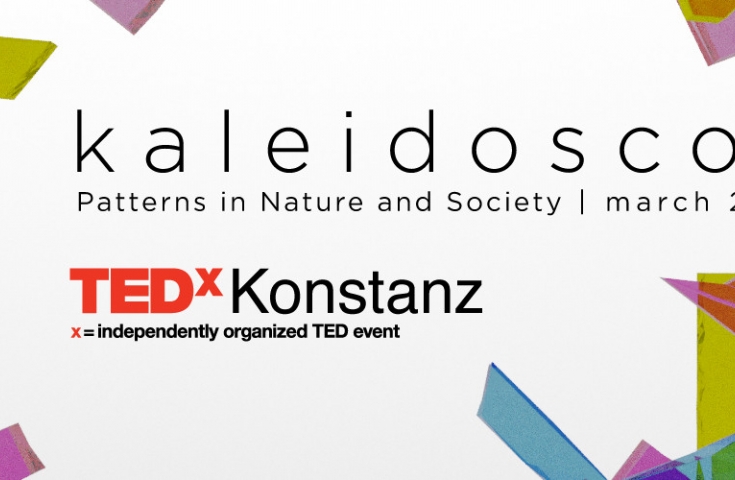Infinitely far, infinitely close
Giving a stage to the best ideas circulating in communities is what TED-talks are all about. First introduced in the United States, they have spread worldwide thanks to YouTube. For the second time, a group of early career researchers and students of the University of Konstanz brought the independently organized TEDx Talks to Konstanz. After anti-coronavirus measures were relaxed, the event could take place in person this year.
The motto "Infinitely far, infinitely close" applied – of course – also to the coronavirus pandemic. The perspective of what is near and far has shifted during the pandemic, explains Dr Caterina Moruzzi, one of the organizers of TEDx. Places like the supermarket next door suddenly seemed far away, others – thanks to online networks – closer than ever.
After many months of coronavirus restrictions, the closeness was a bit unfamiliar at first. Nonetheless, a young, international audience eagerly met in the Wolkenstein-Saal to gather new insights from science and art, business and alternative projects. The talks were thematically very varied and were met with great interest.
Seen from afar
Tom Hegen took the audience into the air with his impressive aerial photographs to show them how people have changed the landscape – in the production of sea salt, in the mining of lignite, in the extraction of lithium.
It takes about two years of preparation to take one of his often award-winning photos! The results offer us the unique opportunity to change perspectives, according to the aerial photographer, and hopefully to realize: Everyone impacts their natural environment, everyone shapes the Anthropocene.
https://www.youtube.com/watch?v=lJTgyuOpKZQ
Taking not only humans, but also biotechnology or medication to space, offers great opportunities to advance research in these areas. Mark Kugel (Yuri GmbH) illustrates the unique benefits of experiments under zero gravity.
https://www.youtube.com/watch?v=__CWV-lI-dI
As near as nano
Imagining very, very small elements of nature is at least as difficult as measuring the vastness of space. Chemist Dr Cristina Ruiz Agudo of the University of Konstanz tells the audience about her nano-research on crystallization, which she links to the development of sustainable materials, such as a variant of commonly used cement. Considering that cement is the most used material after water, more sustainable cement could massively reduce the carbon footprint, says Ruiz.
https://www.youtube.com/watch?v=jDHboO9oGn8
Professor Barbara Di Ventura from the University of Freiburg uses synthetic biology methods, so "nature can be repaired with the help of nature", the biologist explains. Using an example, she shows how elements can be genetically encoded for light sensitivity and thus put at the service of research. With such methods, the scientist hopes, illnesses can be treated in the future with less invasive procedures.
https://www.youtube.com/watch?v=y22XanuUxco
Alternative life forms and ....
In the second part of the Talks, limnologist Professor Lutz Becks from the University of Konstanz presents the coexistence of symbiotic creatures.
https://www.youtube.com/watch?v=m7_R0Evj8HE
The story of how the search for sustainable alternatives becomes a vocation is told by Ute Elise Paluch and Thomas Schumacher from the farm "Haettelihof".
https://www.youtube.com/watch?v=jvxYsi33GP8
… artificial intelligence
How well-suited is an applicant for a job? What school grades will children achieve? How likely is it that an offender is going to commit another crime? AI expert and artist Buse Çetin explores the connections between potentially biased AI algorithms and social injustice.
https://www.youtube.com/watch?v=-A7ma8fODKw
Lastly, María Alejandra Quirós Ramírez of the Zukunftskolleg brings Loving Kindness Meditation and virtual reality together. (Video coming soon.)
"The first TEDxKonstanz in person was a challenging, but at the same time enormously enriching experience for us," summarizes Dr Caterina Moruzzi, who works in the Department of Philosophy at the University of Konstanz. "Above all, we wanted to provide a meeting place for everyone to exchange knowledge and get inspired. In this way, we are slowly returning to the pre-pandemic situation where we often enjoyed community events. Thanks to the animating presentations of the speakers and the dedicated team, it was a huge success. We hope to offer this opportunity in Konstanz again next year."
See you again at TEDxKonstanz 2023!
Link to the TEDx website with videos of the event: https://tedxkonstanz.com/talks/
Claudia Marion Voigtmann
Verwandte Artikel:

